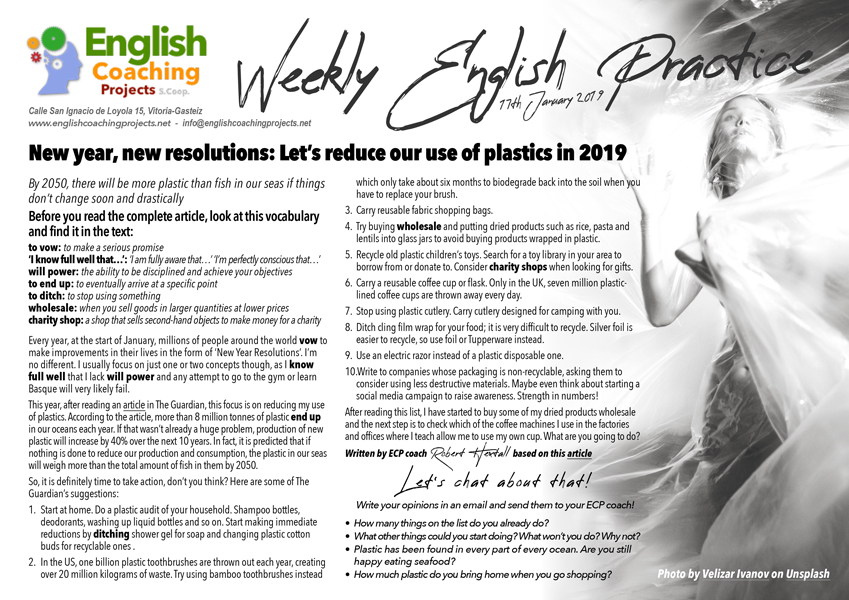ECP coach Rob talks about how he is trying to reduce the amount of plastics he uses. To find out more, read this week’s Weekly English Practice!
Click on the image to download the pdf
By 2050, there will be more plastic than fish in our seas if things don’t change soon and drastically
Read and check you understand this vocabulary before you read and listen to the text:
to vow: to make a serious promise
‘I know full well that…’: ‘I am fully aware that…’ ‘I’m perfectly conscious that…’
will power: the ability to be disciplined and achieve your objectives
to end up: to eventually arrive at a specific point
to ditch: to stop using something
wholesale: when you sell goods in larger quantities at lower prices
charity shop: a shop that sells second-hand objects to make money for a charity
Listen to the audio (refresh the page if it’s not visible)
Every year, at the start of January, millions of people around the world vow to make improvements in their lives in the form of ‘New Year Resolutions’. I’m no different. I usually focus on just one or two concepts though, as I know full well that I lack will power and any attempt to go to the gym or learn Basque will very likely fail.
This year, after reading an article in The Guardian, this focus is on reducing my use of plastics. According to the article, more than 8 million tonnes of plastic end up in our oceans each year. If that wasn’t already a huge problem, production of new plastic will increase by 40% over the next 10 years. In fact, it is predicted that if nothing is done to reduce our production and consumption, the plastic in our seas will weigh more than the total amount of fish in them by 2050.
So, it is definitely time to take action, don’t you think? Here are some of The Guardian’s suggestions:
- Start at home. Do a plastic audit of your household. Shampoo bottles, deodorants, washing up liquid bottles and so on. Start making immediate reductions by ditching shower gel for soap and changing plastic cotton buds for recyclable ones .
- In the US, one billion plastic toothbrushes are thrown out each year, creating over 20 million kilograms of waste. Try using bamboo toothbrushes instead which only take about six months to biodegrade back into the soil when you have to replace your brush.
- Carry reusable fabric shopping bags.
- Try buying wholesale and putting dried products such as rice, pasta and lentils into glass jars to avoid buying products wrapped in plastic.
- Recycle old plastic children’s toys. Search for a toy library in your area to borrow from or donate to. Consider charity shops when looking for gifts.
- Carry a reusable coffee cup or flask. Only in the UK, seven million plastic-lined coffee cups are thrown away every day.
- Stop using plastic cutlery. Carry cutlery designed for camping with you.
- Ditch cling film wrap for your food; it is very difficult to recycle. Silver foil is easier to recycle, so use foil or Tupperware instead.
- Use an electric razor instead of a plastic disposable one.
- 10.Write to companies whose packaging is non-recyclable, asking them to consider using less destructive materials. Maybe even think about starting a social media campaign to raise awareness. Strength in numbers!
After reading this list, I have started to buy some of my dried products wholesale and the next step is to check which of the coffee machines I use in the factories and offices where I teach allow me to use my own cup. What are you going to do?
Written by ECP coach Robert Hextall based on this article
Let’s chat about that!
Write your opinions in an email and send them to your ECP coach!
- How many things on the list do you already do?
- What other things could you start doing? What won’t you do? Why not?
- Plastic has been found in every part of every ocean. Are you still happy eating seafood?
- How much plastic do you bring home when you go shopping?


